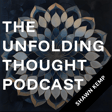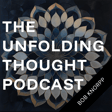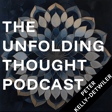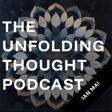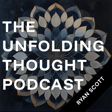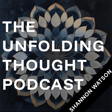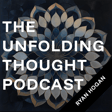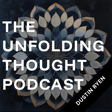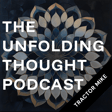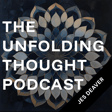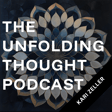Introduction to the Unfolding Thought Podcast
00:00:03
Speaker
Hi, I'm Eric Pradham. Welcome to the Unfolding Thought Podcast, the show for leaders and deep thinkers who demand more than the usual fluff. If you're the kind of person who moves on from a book, video, or podcast the moment it stops making you think or introducing you to something you can use, I hope you'll feel right at home here.
00:00:25
Speaker
In each episode, we uncover the deeper, often overlooked forces that shape our thoughts and behaviors so you can see yourself, your team, and the world from a whole new angle and then actually apply what you learn to grow and do better.
00:00:42
Speaker
On the Unfolding Thought Podcast, we aim for minimal filler and maximum insight, challenging assumptions and sparking new thinking every step of the way. Are you ready to dive deeper?
00:00:55
Speaker
Then let's get started.
Sheila Burkett's Career Journey
00:00:57
Speaker
Today, I'm talking with Sheila Burkett, CEO and co-founder of Spry Digital, a digital agency focused on user experience, branding, and digital products.
00:01:08
Speaker
Sheila and I discuss her journey from starting as an intern at Edward Jones to becoming a general partner, venturing into the racing business with her husband, and eventually founding her own digital agency.
00:01:21
Speaker
Sheila is an outspoken advocate for women in technology, leadership, entrepreneurship, and more, in addition to social and community causes she cares about.
00:01:33
Speaker
Like me, many people that I know respect and are impressed by Sheila, and I hope you will be too. Word of warning, Sheila's audio gets a little quiet for a word or two at times.
00:01:46
Speaker
That is 100% due to how I set up the recording. Most of the time, it's fine. But there are points when you might have to listen hard to pick up what she's saying.
00:01:58
Speaker
The conversation is still very valuable, so I hope you will give me a little grace with how I set up this recording. And now I bring you Sheila Burkett.
00:02:10
Speaker
Sheila, thank you for joining me. Would you mind telling me a little bit about your background? Sure. ah Sheila Burkett, CEO and co-founder of Sprite Digital. We are a digital agency based out of St. Louis.
00:02:22
Speaker
focused on the user experience, brand, and digital products of the space. So it's little fun company. It's been 15 years I've had that.
00:02:33
Speaker
Prior to that, I started my career at Edward Jones and when I was 18 while I was going to college. I was the second person hired there at Helpdesk and got hooked on technology, changed my degree to be in technology,
00:02:46
Speaker
and worked my way up to be a general partner in the IT area there. And I like to say i had responsibilities somewhere over those 20 years for some part of the software except for customer statements and for taxes, because I really hated thinking having to work the 31st of December every year.
00:03:08
Speaker
So I was able to not take those responsibilities on. That's one of those, how do you navigate through the things that you know you want and don't want. So It's a great example.
Venturing into the Racing Business
00:03:19
Speaker
Between there, where I started Spry, I also ran, after I left Edward Jones, my husband and I had a race and sports car management shop. So we did engine management systems, built race cars, had a race team.
00:03:35
Speaker
And that's where I cut my teeth on using all the open source free software be small businesses and learned and everything from eBay and stores and SEO by doing it in a really interesting way.
00:03:52
Speaker
And then my husband and I bought a 27,000 square foot commercial building downtown on Lafayette and did a historic redevelopment of it. Because why not?
00:04:03
Speaker
And sold that in 2022. So I've done a few things. I've done a lot of consulting in between. And so that's kind of a little bit about my background. I have a degree in information systems and business from the University of New York St. Louis and my MBA from Lafayette.
00:04:22
Speaker
So I have been in the St. Louis metro area most of my life. Raised three boys in the Webster School District. I have a lovely husband who is in computers also and has started its own business focused on artificial intelligence. So we're an entrepreneur family, I like to say. And that's a little bit about me.
00:04:45
Speaker
Thank you. I appreciate that. So you may very well have told me about this race business. I think it was that you said you started, but I did not recall that.
00:04:59
Speaker
And so I'm wondering what it was that took you into that line of business. So interesting enough, my husband had quit his nice, cushy computer job the year before I quit my job at Edward Jones.
00:05:14
Speaker
And he had decided he was racing cars with the Sports Car Club of America. And he decided that he wanted to help other people build their race cars.
00:05:25
Speaker
And so he had started that. And as I was getting the itch to do something else, he said, why don't you quit your job? Now, mind you, I was a dental partner, cushy job with lots of responsibility.
00:05:39
Speaker
And we had rented, you were renting space in a warehouse of rental's egg. And he's like, come, let's build this business. We had an opportunity to buy roll cage business now.
00:05:52
Speaker
You're like, what? Like, a like literally we had a guy in St. Louis who had been doing roll cages and race cars. He was selling his business. So we bought all of the product that he had, all of the machine that he had.
00:06:07
Speaker
And that's kind of what got it started is my husband was in racing. we decided to help our friends who were in racing. We were subleasing space to people who had race cars to store the race cars.
00:06:22
Speaker
I was buying products on pallets for resale. So imagine race cars use a lot of bolts and washers. And so I had bought all of these.
00:06:35
Speaker
great big pallets of parts and we're selling them on eBay. That was when that was where you sold things, you know, from an e-commerce perspective. here but So I had an e-commerce store and ah that's kind of how we got into it and what we were doing. It was really fun.
00:06:49
Speaker
So as you're describing what got you into that, it sounds like perhaps for your husband, and I imagine for you, there was something similar, but you came into it perhaps differently.
00:07:03
Speaker
It sounds like there an opportunity at a minimum for your husband, if not also for you to sort of turn a a passion into a career.
00:07:16
Speaker
And I don't know if you would call it a career, but a job or, you know, maybe for him at the very least, if not also you being a part of something with him, you were able to make it not just a job and something where for one or perhaps both of you, you felt like I'm lucky to get to do this every day. Is that correct?
00:07:37
Speaker
Yeah, for a while. So it was really kind of one of those things. We got to work together. We loved working together. we were involved involved with the sports park club community and leading. And so we were leaning in and able to spend time doing that.
00:07:51
Speaker
My entrepreneur spirit was about learning so many things. So that's where I learned about content management systems and building websites. And so I trained myself to do all of those things.
00:08:05
Speaker
I got to have that learning experience. And racing's fun and it's exciting. I had my race license at the time and was racing cars. So when you're in it and you're like, this would be a fun way to be able to have that flexibility I needed. My youngest was going into kindergarten and I had two boys that were going to be heading into high school and in junior high.
From Burnout to Open Source
00:08:31
Speaker
I was i had an opportunity to experience their last few years of being at home and also that needing to reset myself.
00:08:46
Speaker
So corporate life, traveling all the time, ah heavy responsibilities, I had really burned myself out and needed a reset. And it was an opportunity for me to do that.
00:08:59
Speaker
Thank you. i appreciate that. You also mentioned, I believe, so you just mentioned, I think it was a content management system and ah more or less teaching yourself to build websites or something along those lines. i think when you first mentioned this line of work, you also talked about open source software.
00:09:21
Speaker
which, if I recall correctly, is a big piece of Spry Digital's focus. Am I remembering that correctly? You are, right. So that roots.
00:09:33
Speaker
So imagine I was in this corporate tech environment where OpenSource was just absolutely hands-off. At the time, Linux was... in the server space really taking hold.
00:09:46
Speaker
And, you know, we were fighting the corporate level of like bringing Linux even in and thinking about it. So all of those early discussions and the web was really taking hold. And this is 2006. So, you know, everybody, it's hard to imagine that that was after the big tech bubble in the ninety s And early to that was when it busted.
00:10:10
Speaker
Well, there was Google had just come along. Google was giving away free email and all encouraging all the businesses to start.
00:10:21
Speaker
So I was able to quickly use the Google open source tool. Basically, I considered it open source. It was free. So setting up business emails and being able to have collaborative tools that was, you know,
00:10:34
Speaker
really a great way for small businesses to use it. And then the content management systems, ironically enough, Sports Car Club of America, we had our local website on a.NET NUC,
00:10:48
Speaker
platform which is opensource.net platform. So I really started there helping with their website. And then i learned WordPress, which is an open source.
00:11:01
Speaker
I learned Drupal, which is still what we do today. And I also learned Joomla, which is also for content management systems. And while I was doing this kind of as a side opportunity, I always wanted to teach teaching education, a really big deal for me, public education. like And so I had been serving on the IS advisory board at UMSL.
00:11:27
Speaker
And I had encouraged the business school to create a course for every business student that required them to learn HTML and to really learn enterprise systems so they can make better decisions.
00:11:39
Speaker
Well, when I left Jones, that class had been approved and I got asked to teach that class. class is I'd helped build the curriculum. So I got to go teach a class at the university that I had helped build the curriculum because I was so passionate that every business person in 2006 needed to learn HTML.
00:12:00
Speaker
I knew that's what needed to happen. And, you know, that was the MySpace phase. So if you remember in MySpace, people were doing HTML in order to build in MySpace pages.
00:12:11
Speaker
So all of it comes together, right? And having that vision to be able to say, we've got to start teaching people these basics now so that in the future, This isn't so hard.
00:12:22
Speaker
They understand file systems. They understand how the internet works. So as they're making decision, they can. So as the opportunity to start Spry came about, i was already deep in, i had 20 clients where I was doing their websites on content management systems with the open source. And I really believe, still do to this day, that what open source has done for the small, medium businesses and nonprofits is given that ability to compete with larger competitors and to really
00:12:59
Speaker
take advantage of technology that they may have never been able to afford before. And I think that's the beauty of that environment is you have this collaborative environment where people are building these tools and you're using them and getting back to their communities.
00:13:14
Speaker
And still to this day, you know, I think our roots are always going to be open source. We talk every once in a while about in being in other spaces as you grow your business.
00:13:27
Speaker
But I think fundamentally that foundation of open source is critical to small businesses, nonprofits and medium sized businesses. It sounds to me like what you've brought together in your experience, in your career, having more of sort of a technical or infrastructure related background on the technology side of things, and then layering on top of that things that were explicitly marketing or marketing adjacent.
00:14:00
Speaker
It sounds to me like what you have experienced or what you've built in your pool of experience in your career shows up quite clearly in what Spry Digital does in that, at least as I understand it, you are heavily focused on technical aspects of marketing marketing technology or e-commerce or technical aspects of
Aligning Technical and Marketing Strategies
00:14:29
Speaker
communications for businesses. I don't want to stretch this too far or misrepresent it, but
00:14:34
Speaker
that a big piece of this is how people show up in the world and how they are communicating or sorry how businesses how your clients show up in the world and how they're communicating with their audiences am i drawing a fair comparison yeah how do you make it easier so that everything works together operationally Right.
00:14:56
Speaker
I don't know how many times we'll have websites that, you know, you've sent a contact form and you hope that somebody is going to respond to you. Right.
00:15:06
Speaker
And a lot of times because that contact form isn't going into either their sales system or isn't getting directly into and front of the salesperson who needs And then if you think about if you're doing an order online,
00:15:24
Speaker
are you know not only making sure that it goes into the fulfillment process, but keeping inventory real time. And nowadays, we have so many systems, Shopify, and there's so many like pre-built systems that you just plug into and use.
00:15:41
Speaker
But 20 years ago, that didn't exist. You had to build everything from ground up. Now we have this opportunity to take your website and not make it just a marketing brochure but to make it the hub of how you can bring your customers together, your salespeople together, everyone into a space where they have one place that they can rely on for current information.
00:16:10
Speaker
So even like one of the things we're working on today is ah how do you integrate a product catalog or product information management system? um Some, you know, if you have 2 million SKUs, how do you make it so that everything is operational between the ERP system and the website and that you're not bogging down your e-commerce experience while somebody doing a mass update of 500,000 SKUs?
00:16:39
Speaker
you So you've got to think about those operational things in a small to medium-sized business as you grow. And nowadays, users expect your website to be fast. I mean, if you really think about what Google penalizes you on, right?
00:16:55
Speaker
It's your performance of your website. So your rankings get impacted by how well you're website performance. And so if you have to wait two to three seconds in order to get something back, that's a key impact to the customers.
00:17:11
Speaker
And so you have to understand multiple, you can't just understand a part of it. So at Spry, we really think about what is the business aspect that we're trying to solve?
00:17:22
Speaker
What are those business problems? And How are the users impacted? And the user could be a customer, a potential customer, the sales operations team, all the people.
00:17:33
Speaker
And then what are the most effective ways strategically do that? How do you do that with making sure you're thinking about not only just what the website needs, but what the whole organization needs and building these strategies where Maybe the iteration one doesn't have it, but by iteration three, you have low c of functionality.
00:17:53
Speaker
And then you bring that ongoing, what we call love and care, right? That product lifecycle support that keeps that growing and interaction happening so that it becomes kind of that hub that not only marketing and sales is relying on, but operations too.
00:18:12
Speaker
Are there certain kinds of projects, you know, when when we think about marketing shops or digital marketing shops, or we can put any label on different groups that we want to, but...
00:18:27
Speaker
Are there certain types of, let's say, website projects or e-commerce projects or web app projects that Sprite Digital would or would not generally get involved in?
00:18:40
Speaker
Certain types of things that prospects might or might not call you for? Yeah. I think your standard small brochure website, I'll tell people there's so many easy ways to do that.
00:18:52
Speaker
Go use the the content management systems out there that you can easily spend something up. And there's lots of platforms. I just did one. For some of the volunteers, so in my volunteer side jobs, I always volunteer to build people's side websites because I don't get to do that in my day to day job anymore. I don't get to actually be the build.
00:19:14
Speaker
And so this is Sheila crazy, right? I call it the Sheila crazy. I like volunteer the things that I'm it's easy for me to do and I'm going to learn things that I need to know my job. And so I built a website using GoDaddy's new AI builder that builds a simple little website at one page.
00:19:31
Speaker
It was super easy. I did it in two hours. It was a very simple content piece. It wasn't didn't need to over-design. It didn't need anything special. That is not stuff we're going to do, right?
00:19:44
Speaker
That's stuff that that doesn't require a lot of customization, doesn't require a lot of thinking about the operations. We find that B2B businesses that are privately held tend to be privately held that are in typically family owned sometimes or second to third generation. So if you think about it, they've been around for a long time.
00:20:08
Speaker
They've been very successful and haven't really invested in their digital presence. And so as they're starting into that next generation, thinking about first, how do you codify what that brand stands for?
00:20:25
Speaker
And then how do you visually take the brand into the next generation while holding on to that culture of what they've built?
00:20:36
Speaker
And then how do you bring that into the big build space to show your future thinking and integrate it integrateed into an ERP system?
00:20:47
Speaker
How do you enable the sales team to be proud of using the website, giving them the sales sheets they need online, giving them those sales tools that they can use?
00:20:58
Speaker
Because that's the first step in a B2B is how do you get your sales team? on board with it then how do you bring your product to life on that and so that gets into your e-commerce concept and it's usually a phase to close right you start by how are you enabling the sales of dealers and then getting them that portal and then how do you get it to where it's a real-time vibe so then you think about the customer experience they really want to be able to place their order without waiting for a salesperson, right? The younger the people are making those decisions, the more digitally savvy they are, the more likely they're going to want to actually be with the order online and not talk to someone.
00:21:42
Speaker
So thinking about how do you get to that? So the companies that we like to work with and that we find that are most successful, they're in that growth mode. They have a CEO who wants to grow digitally, but not sure how to execute that.
00:21:56
Speaker
And we start with working with the CEO and helping them see that. Thank you. I appreciate all that background because in part, I wanted to make sure that we did justice to, you know, kind of your your day-to-day work because yeah you've also mentioned volunteering and boards and nonprofit work, which I do want to get to.
00:22:20
Speaker
But, you know, for... spry wanted to make sure that we were clear kind of where you fit or if someone's in the right place might spry be an organization that they want to look up so i appreciate you going through a little bit of that background now to your background and your experience.
Growth from Corporate to Entrepreneurship
00:22:46
Speaker
You know, you were at Edward Jones. You moved from intern, I think it was, up to, I think it was general partner, if I recall the title. So you were fairly senior, I believe,
00:22:59
Speaker
You've started two or three businesses and you've been part of Spry for, think you said 15 years.
00:23:11
Speaker
Now you're co-founder and CEO. And so I'm curious, having been a leader in a few different environments and different sizes of organizations, I think Edward Jones is publicly owned.
00:23:29
Speaker
No, they're privately held. Okay. But a large? Very me large, privately held business. Yes. And then you've started businesses of different sizes, eventually, you know, different sizes. They all start small, of course.
00:23:46
Speaker
And you've been part of Spry Digital for quite a while. So I'm curious about in your career, have there been key moments that have shaped how you lead and how you think about business?
00:24:00
Speaker
Ooh, that's a question. I think at a very young age, when I was at Jones, I was giving, there were so many opportunities because it was a growth mode company that there was never enough people to do the work.
00:24:17
Speaker
So I've always been in environments, I feel like, where there's never enough people to do the work. And in those growth mode companies where there's never enough people to do the work, Opportunity presents itself.
00:24:29
Speaker
And the opportunities are always those. They're there. It's how do you step into them? And i think I was i grew up very poor. i didn't have anybody who was going to rescue me. So I had to pay for my own schooling.
00:24:46
Speaker
I had to pay for my living expenses. fences So I think that that need to have financial security coupled with I just love to learn and I love I probably have that fear of missing out, too. So there's probably some of that.
00:25:03
Speaker
But i I had goals for myself. So, you know, i always set out five and 10 year goals from the time I was in high school. And I would set my goals out and say, OK, I want to get here. So I'm going have to get to be a team leader.
00:25:19
Speaker
Before a team leader, I had to be a project manager. And so my first in, you know, I was working at Health Desk, but I also then added a project between my freshman, sophomore year where Edward Jones let me in another a part-time person drive a project while we were still working. So in between, right?
00:25:41
Speaker
Always more, but it was free. And I built a time recording system for them, trying to get IT people to do time recording. And the big joke is 40 years later, I really think if I were going to change the world, it's like, how could you eliminate people having report their time?
00:25:56
Speaker
Because people hate it and it's a big pain. So that was my first project. So I already shown some leadership there. And I was then given the opportunity to go full-time while I was in college.
00:26:09
Speaker
When I graduated from college, I pain i was then in software development. And i was given this number two project for the company.
00:26:21
Speaker
a year out of college. That opportunity, right, was scary. I mean, I was doing something that was the number two project for the company. I moved a million mutual fund accounts from one system to another.
00:26:36
Speaker
Back then, like, the competing power was, like, you know, not what it is today. And I had a really experienced team of really experienced programmers, but they still screwed it up.
00:26:48
Speaker
And it took like 48 hours for these batch jobs to run. and My boss is screaming at me to get it fixed. We got it fixed. I didn't get fired. So the opportunity was to fail. I grew up in an environment where I could fail and I could find it.
00:27:05
Speaker
I literally, i was probably, 21, 2021, I accidentally took the entire production system down.
00:27:16
Speaker
Like, accidentally. i got yelled at. a lot about that and made fun of. But the reality was they didn't fire me. So fast forward to like fast forward to today in my company, people are like, people would have been fired over something. And I look at Michael, why would you fire someone when they make a mistake? You know, we failed them.
00:27:37
Speaker
We didn't give them the, you know, the fail-safes. We need to teach them and we need to make sure they understand that they learned from that. Right. people are going to fail. But firing someone because they failed just means you have to go hire somebody and retrain.
00:27:52
Speaker
And we're going to fail. So I got the opportunity to fail. And I think that gave me that willingness to try harder things that gave me the willingness to stop then.
00:28:02
Speaker
So they would send me off on they'll meet with the managing partner and do his pet project. Or, you know, I came back from maternity leave in 2000, in 2001, and my boss is like, he gave 250 projects that had not been approved. And he goes, I need you to go organize these, go get them approved by the CFO and the managing partner.
00:28:25
Speaker
Like, okay, right? But they had faith that I was going to figure it out and I was going to do it, you know, and I had to bring you know, clarity to the upper management. So, you know, we're talking about multi-million dollar projects that were very technical that I had to, A, figure out myself and then be able to go explain to the CFO and the managing partner.
00:28:50
Speaker
And the managing partner, his rules were, if you can't explain something to me and three bullet points, you don't understand it. So imagine that, Eric. If you can't explain something and three simple bullet points, you don't understand it.
00:29:06
Speaker
Now, I had been taught that in my 20s. So my job has always been to understand it well enough to simplify it so that when you think about what I brought in this guy, right?
00:29:19
Speaker
I have to be able to think about the hard things, but explain in as simple as possible. But one of my challenges is how do I give people that experience? I cut my teeth in really difficult situations.
00:29:32
Speaker
And the only way you get experience and learn is by having this opportunity to do that. I had a really good friend, a friend of mine mentioned she's a coach and she's now, she used to be a real coach, like a soccer coach. And then she went in and she started coaching people.
00:29:50
Speaker
And you know what she said, she's like, the great thing about being a coach is every year you have to build trust in the beginning. You're always building team. And that hit me.
00:30:01
Speaker
I was like, oh, you're right. You're always building team. So what a beauty, right? That part of our jobs as leaders is you're always building team and you're always building trust and you're always, and it can be repetitive, right? It can feel repetitive, but that's our job.
00:30:20
Speaker
It's interesting how, at least for me, you really clearly bring out that there are a lot of factors that go into having a strong team, having a strong culture, being able to lead not just today, but a month from now and a year from now.
00:30:41
Speaker
And that because you never, I guess, as people say, sometimes step in the same stream twice, you that for a leader, you know, not necessarily being able to say, well, I do it like this.
Leadership Challenges and Strategies
00:30:55
Speaker
And so if I teach you the same process or whatever it is for how to build a website or how to reduce a pitch for a client down to three bullet points, perhaps now my job is done.
00:31:08
Speaker
But rather, that, well, one, you're often working with new people. Next year, you might have a new person on the team or you might have five new people on the team. And also, there are certain things that I don't know if you exactly said this, but that I'm thinking there are certain things about being a leader that No one else is going to do that thing.
00:31:32
Speaker
And do you have to learn to get good at the things that create an environment where people are willing to begin trying new things.
00:31:44
Speaker
And so as you're talking, you're also making me wonder if you know some of these things making people feel like they're safe trying new things are these practices that at least for spry digital help generally your people feel like they're truly invested in their work and in the collective in the group there it's an interesting evaluation, right?
00:32:12
Speaker
i I always say we, we sometimes tend to send out our pulses or polls when we had to share some news that is not as good as like the positive news, right?
00:32:26
Speaker
You won a contract or you lost a contract, right? And I keep going, you know, if you trace the results, it's always based on what news has been shared in the most recent.
00:32:37
Speaker
And it's always the, you know, the mood of the organization, right? That in their resilience, the organization's resilience, right?
00:32:48
Speaker
To the wherewithal of what's going on in the world. And I, I believe that deep down, right? um i'll I'll give you an example.
00:32:58
Speaker
at the Near the end of last year, we found out one of our clients is going to pull back on their budget significantly. We knew we would have a smaller budget for 2025 than 2024 and that we know we're going to have to cut staff.
00:33:12
Speaker
So very quickly, we pulled the team. Here's what's going on. Here's what's happening. We will have to make cuts. Here's when we think it's going to happen. Our leadership team is meeting, doing daily stand-ups.
00:33:26
Speaker
We're doing weekly updates to the team on financially, where things are, how we're doing on sales. but keeping them updated. Here's where it is. And with the individuals directly impacted, we've already had, we've had those conversations.
00:33:40
Speaker
We know you're going to be impacted. Here's when we think it's going to happen. Here's what we want to do to help support you. And here's, you know, we gave them as early as possible. So some would say we're being too transparent.
00:33:53
Speaker
We're giving them too much information. too soon. They're, you know, you're going to lose all your good people. While there have been people upset, there are people a little anxious.
00:34:04
Speaker
We have yet to use any that. Instead, they're all like, even the ones that know they are going to get laid off have said, I really want to come back. I really want to be here. And I think that says a lot to that deepness of what's there.
00:34:21
Speaker
I believe the more you share with people and help them understand situations, that they're rational, they're going to understand. And if they don't, it's our job to help them understand the situation.
00:34:34
Speaker
Catching people off guard and treating people as a number will not do you any good in the long run. You lose their trust. You lose their willingness to think about the company as their own and how do they improve it.
00:34:51
Speaker
Since we had this, I've had more innovation happening within the organization about how do we make something a product, like productizing, how do we diversify our revenue?
00:35:02
Speaker
We're basically service-based, 70% retainer business, so not horrible, right? But how do you diversify that? away from day-to-day services and have pass more passive inputs.
00:35:16
Speaker
The team has now finally got that after about a year of us really trying to get them to understand that, right? Like, hey, we're not telling them. We've kind of shown them some things.
00:35:27
Speaker
Now they're telling us because they have ownership in it. They want to make that happen. And so I think it's all in how much you educate them about the whole how home work, why you're doing things.
00:35:41
Speaker
And they're not going to get it the first time, right? But consistency and simplifying the message down so it relates to what they understand is important.
00:35:53
Speaker
I still have some young people are like, I'm fine. I don't need a lot of explanation. I'm okay. I have one young person. He's not even 30 yet. He's been with us over six years, almost seven.
00:36:08
Speaker
He's been with us since he was an intern. And he's like, this is what business is about, right? I can't control that. What I can control is what my day-to-day looks like and how i get to live my life.
00:36:19
Speaker
And I'm like, you're right. Does a great job every day But he was able to take a five-week vacation also. Five weeks, he went off and went to Germany to see family.
00:36:30
Speaker
And while other people picked up his work, he came back and he had new life experiences. that And he was refreshed and ready to go around. So giving everybody that ability to do their things and still come back together is important.
00:36:43
Speaker
So I think that's how you build that. and get people to be trusting deep down. But surface, but if there's always going to be surface reactions. But I think a lot of times i see what I call the surface reaction of whatever the need of the day is.
00:36:58
Speaker
So I'm trying to get people to be more cognizant of like, you know, don't send that ENPS score out after we just told the team that we lost a big agreement, right? Like, let's not do that to ourselves. Like, not that I, you know, I don't care that they're upset. It's that they are upset.
00:37:14
Speaker
They're going to be upset. They deserve the right to be upset. And by the way, this was just during ah very, for my team, the last three months have been hard. There's so many things going on in the world that they can't control.
00:37:29
Speaker
So like, you just got to give people time to not be weary. The sun comes out and like a beautiful sunny day. Let's all embrace it. At one point, I think I heard you saying that maybe it was around productizing or there was something about maybe thinking of the business differently or being innovative. And I think I understood that There were some things that you had to kind of beat the drum for a year or a year and a half before you started to see consistent action on those things. And one thing that came to mind for me was, i guess, the question of, it seems to me like in plenty of organizations,
00:38:18
Speaker
What might be interpreted by the leader or executive team as resistance to change might be that while the leaders understand that we need new thinking,
00:38:34
Speaker
or innovation, or we need to change the way that we do business in one way or another, that it hasn't been explained to the workforce in such a way that they can understand it and or they haven't been exposed to this information for long enough.
00:38:51
Speaker
And so what I as a leader might interpret as my workforce, my staff being resistant to change, Is it possible or do you think that sometimes it's that they just haven't explained things in the right way, like the three bullet points that people can understand and or they haven't given their people enough time to come to grips with what is being requested. And it's not necessarily resistance.
00:39:23
Speaker
It's the way you explain it, the context, the time, something of that nature. Yeah. So, you know, the basis of communication is if someone's not understanding your message, it's not their fault.
00:39:36
Speaker
I'm repeat that. If someone doesn't hear or understand your message, it's not their but So there's a, in our company, we really think, and I've thought about this for a long time, like I, I've been overanalyzed from all this various personality tests, right?
00:39:54
Speaker
And one of the things that's important is under so understanding how people need to receive information and what kind of information they need in order to be able to absorb it.
00:40:07
Speaker
So we use desk profile a lot through online site called Crystal Nose. So Crystal Nose gives you the ability to go out. You can take the Myers-Briggs. You can do the desk profile.
00:40:20
Speaker
It takes you through all of these various personality tests. And it's an AI tool behind it that will help you understand what your personality is. So you have a self-awareness of who you are, how you communicate, not only like what your communication patterns are, but just based on your personality, like what kind of information you need in order to make a decision and understand.
00:40:44
Speaker
But it also helps you understand what others need. And so you can then start to look at, is this person a detailed person? They're an analytical person, so they need data.
00:40:55
Speaker
Are they a questioner? And so they're going to ask questions no matter what you present to them. And you need to be prepared to answer them and give them time to think. Are they... a planner and they need to see the whole plan?
00:41:09
Speaker
Do they really need to see that path? So not just the vision, but the strategy with it. And that's why sometimes we'll see people will cluster together with people that are like them. Because it's easier, right?
00:41:22
Speaker
If you're all the same and you talk to people and they get you right away, that's an easier relationship, right? But if you have to spend time communicating your message in different ways,
00:41:32
Speaker
multiple times. I think but but the adage is you need to tell your message seven times in order for it to be heard. And I say in seven different ways. ah Sometimes you just have to keep thinking about the different ways you're saying the same thing.
00:41:46
Speaker
So there's that consistency in the message, but you say it in different ways. It's to bring it together. but So I believe in that wholeheartedly. Someone explained to me once that some people are just naturally able to see a vision.
00:42:03
Speaker
of the future where they may be able to immediately hear something and think about how does that translate into a futuristic thing, a vision.
00:42:13
Speaker
My husband is really great about sharing and ideas technology-wise and he'll start talking about deep technology things. it He'll start talking about AI in a really deep way.
00:42:24
Speaker
And my immediate is visioning, oh my God, you could apply that this way. And here's how that can happen, right? So that ability to take in information, process it, and think about the future, there's some people that are really, really, really good at that.
00:42:41
Speaker
Then the challenge taking that vision that you're so passionate about and you can see so clearly, but then be able to back and articulate it down to the person who needs to execute everything.
00:42:54
Speaker
a very specific task. And that's what we call alignment, right? When we talk about alignment, it's like, here's the big picture vision everybody has. Here's the goals, strategies, objectives that have been put in place. This is how we're going to measure it.
00:43:08
Speaker
But how do you get the person who's doing task on a project understand how that aligns to the bigger vision? So no matter what size of organization, our job is to help them pull that string from You may be just answering emails from the client.
00:43:28
Speaker
Here's the bigger picture. Here's what you're helping them with. Here's how you're going to elevate. Here's what this is helping you learn. And helping them see their purpose in the company goes back to that culture, right?
00:43:40
Speaker
People who see their purpose and how they completely align. is important. I don't know if you've had a chance to ever go walk through the Cambridge Engineering.
00:43:52
Speaker
They offer a floor in their company experience where they will take you and walk you through how they do the morning meetings, how they build culture, how they do all these things.
00:44:03
Speaker
And it is phenomenal. And what it is, is every single person no matter what their job is, understands their purpose in the company. They all work together to innovate. They all are responsible for communication.
00:44:17
Speaker
And it's just beautiful the way they've done it. Because it's that vision we all have that every person gets it. Every person under, it's like, we all want that, right? We want everybody to get it. They understand their purpose. They understand what they're doing.
00:44:33
Speaker
But it requires a communication skills that you have to hone. But everybody has to have that, right?
Barriers and Advocacy for Women in STEM
00:44:40
Speaker
Some of what you've touched on feels relevant to me that i i forget if you said it earlier or not, but i I know this about you, that you are vocal about supporting women in technology.
00:44:56
Speaker
And so it seems to me that some of what you've touched on through the last few minutes is relevant to, you know, do you see major barriers, misconceptions, or other issues that stand in the way of getting women into technology today?
00:45:18
Speaker
Well, there's a lot of barriers currently going on right now that are happening. So I'm not going to go that deep. But I think in the bigger picture, research shows, especially in STEM, that young girls, because of society and the societal messages they receive, that it before puberty, they need to have that confidence built into them around math, science, and their ability.
00:45:47
Speaker
And in order for them to feel confident as they go into puberty in those spaces so that they are not worried about how they're seen in male-dominated spaces, right? That social conscious, right, starts to come in the play and the preteen team area is And so being a smart girl, right, being smart in a math, science, technology space is important to be okay with.
00:46:21
Speaker
And if we can encourage society, if we can encourage our youth and our teaching environments and education ah be okay with smart girls, that oh it's okay that women can know more,
00:46:37
Speaker
possibly as men than men on topics. That's a route, right? That where you have to build their confidence. So as they go into high school and college, right, they're able to withstand people who don't necessarily understand see it that way because of societal norms saying, oh you don't look like what my normal teen does. You don't look like you, you know, I don't value what you're saying because you have to have a lot of confidence and you have to have that ability to withstand and that resilience in spaces where people talk over you, where people ignore you, where people take your ideas
00:47:20
Speaker
where people will use whatever excuse they can to say you don't belong. And so as, you know, I've been involved with a group called the NCWIT, National Council for Women in Technology.
00:47:33
Speaker
And they're research-based organization that have researched these barriers. And they created an a ah award for recognizing young women in that are doing technology and robotics in high school.
00:47:48
Speaker
awards them and then keeps them in a community through college and after college of accursions to stay in touch. So that gave them, they're seeing that piece of that. There's the Grace Hopper Convention that happens in the college level that brings women, people color together with the industry to give them that opportunity you get exposure.
00:48:13
Speaker
So it's important that they're able to see themselves and find other people because we as humans find it easier to be with humans that are like us, look like us, feel like us.
00:48:26
Speaker
So And we all have been raised and with different experiences and values. And so depending on what those are and what you bring into the space, I think I fought hard for that. I grew up in a household where I was told I was never going to be smart enough.
00:48:43
Speaker
I was I mean, i had people in my day to day life. who who othered me. So I always was a top student to prove myself. So that caused me, I was a rebel, right? So I was like, I'm not going to be told no. So I thought to make sure was a really tough student that I was, I mean, I graduated out the corner in my class.
00:49:03
Speaker
I went off to college. I had to fight my way to, you know, be always in the top. And I was the only woman in technology at the leadership level, 90% of the time, I would be the only woman in the room in a large company.
00:49:17
Speaker
I had, i was always the top performer. I was always the one giving the special projects, but I was also the one told constantly what I wasn't doing live, right?
00:49:28
Speaker
Here's how you can be better. Here's how you need to tone it down. Here, like, constantly told like you wear the wrong clothes you're dressed you're you need to wear your hair in a certain way so I always have fought for others because I never felt like I was good and I think that's the why like when you pull the like why would I put so much energy and by doing that I think I've created space for everyone.
00:49:58
Speaker
So what I have found as being an advocate for women in technology, I'm an advocate for everyone in technology because what I talk about people need is what everyone needs, what everyone wants.
00:50:10
Speaker
This isn't, it's really fundamentally, we want work environments. People want work environments where they feel like they can be themselves and don't have to hide, that they can be empathetic and they don't have to hide.
00:50:25
Speaker
They can be a dad, they can be a caretaker, and they don't have to hide. And that to me is what I continue champion, continue to want. I want that for people.
00:50:36
Speaker
I'm going to depart a little bit from the types of questions that I would typically ask and ask you want for myself, because some of what you just talked about, i would love to get your opinion on Something that I'm uncertain about right now.
00:50:55
Speaker
So I think you said you have three boys. Is that right? Yeah. So I have three children, two girls. My oldest is an 11 year old girl and she is very passionate about certain things.
00:51:11
Speaker
She seems to be talented musically and broadly artistically. You know, I don't know if she's the best painter or something like that, but she's drawn to creativity and to
Education and Personal Growth Concerns
00:51:26
Speaker
expressing herself through one form or another of creativity.
00:51:31
Speaker
We homeschooled until this last November. She went into fifth grade in public school. And before she went into public school, we knew that she was not generally drawn to math or skilled at it or however you might want to characterize it.
00:51:51
Speaker
And that didn't particularly concern me because I feel like, especially when you're a child, but also when you're an adult, you tend to improve and then plateau and then improve again in different areas of life at different rates.
00:52:08
Speaker
And so I wasn't really too concerned. If one child is quote unquote, you know, right on track with math or reading or whatever it is, and another child is ahead, another child's behind, well,
00:52:24
Speaker
those measurements are going to be flipped in another category. And then six months later, it will be different. None of that concerned me. But the personal aspects that i I wanted to ask you about, you know, you said things about being told more or less that you were not going to be good enough or smart enough or something along those lines.
00:52:47
Speaker
And my daughter's teacher has identified that she knows how to do the math, that the mistakes that she makes, and then as a result gets quite a bad grade on certain things, are often mistakes of attention.
00:53:03
Speaker
So, you know, you do the problem and you just don't go back and check your work. Now, I don't think that I would draw this down to male-female distinction because I know that I was like that.
00:53:16
Speaker
Right. And now this is just two cases here, right? But if I'm contributing something either behaviorally, genetically, or some other way here, setting an example, you know, I didn't check my work until I was probably 30.
00:53:33
Speaker
I still don't marry. I have people to do that. Exactly. Because I put systems in place because I hate that part, right? Yes. and that's And actually, to that point, as I'm attempting to be a support here, you know,
00:53:52
Speaker
I want to be as realistic as possible and say, you know, if you're going to be in public school, for example, or if you want to go to college or if you want to study certain things, there are going to be minimum bars here. You will have to get over.
00:54:07
Speaker
You're to have to get a certain score on one test or another or take a specific class or who knows what. And then also, Different people will feel different ways about you depending on how you show up or what your grades are.
00:54:24
Speaker
So I can't just make it as simple as, you know, it it does or does not matter. Some of this depends on the context, where you want to go and so on.
00:54:35
Speaker
And some of what I struggle with is when I'm trying to support her, I want to say, and I have said things like this before, and I don't know if they're the right thing, but I want to say, hey in this particular case, on this math question that you got wrong, I know for a fact you know how to do it because you framed the question out properly.
00:54:59
Speaker
But then where you made the mistake, it was just obvious that you weren't paying attention. You just went through it quickly and you didn't put forth the effort or ask yourself the question, did I do this right?
00:55:11
Speaker
And you just moved on quickly and I too quickly. And I don't want her to lock in her head that I'm saying you are lazy or dumb or something like that, but rather You know, you or I, Sheila, we can make a decision that is lazy, right?
00:55:32
Speaker
Or we can make a bad decision. We can make a mistake that doesn't have to say something about who we are as a person. And it sounds like you've... Exactly.
00:55:43
Speaker
Yes. So I have an issue with labels. I think labels tend to be applied in a negative way and not a positive. If you think about the way we as a society tend to put labels on, they tend to emphasize on more negative aspects in the past.
00:56:00
Speaker
And so I think when the labels tend, you know, we like to, categori we're categorizers, right? We like to put people in places. So I try, try. I'm just, you know we're human. We're going always default to what society's thought of, right?
00:56:16
Speaker
I think, one, she's 11 early forming versus an adult. But if you think about what you can provide her as a practice, right?
00:56:28
Speaker
What practices can you help as a young adult, a young teen, to start putting in place that's going to support them through their life to become more self-aware of the things that might be a challenge for them and how that they can put systems in place to support them better on the things that might be impeding their goal.
00:56:55
Speaker
So I think, you know, a lot of times what works for one person isn't going to work for another. And really teaching some what I would call basic practices around what, you know,
00:57:09
Speaker
what are you What are your goals? Okay, as we think about this, there's also things that are outside of the control that they have. But helping her to decide, what does she want the year to look like?
00:57:20
Speaker
You know, she excels in all of these other things. what is What does she want? what does Where does she want to go? And then helping say, okay, here's the minimum in our family bla what our expectations are. As a family, you know, here's, I'm going to let you figure these things out. And here's our metrics. I always go back to the data.
00:57:41
Speaker
What's the data you're putting in place that you're monitoring to say, hey, if this gets out of whack, then I'm going to get involved. But the meantime, I'll let you start to manage it. And then talk about consequences, right?
00:57:52
Speaker
So there's consequences, right? And if it's within the metric and threshold, and if they're okay with it, is that okay? And is it really our hang up? i I wrote a book called Dream Hoarders, and Dream Hoarders helped me put myself in check as a parent.
00:58:09
Speaker
Because what I realized was i was putting my goals, my aspirations on my children Without putting up the lens on well, what is that you want?
00:58:22
Speaker
What have I given you the skills to be able to do that? Is that really where you want to be? And so then, you know, I feel like I invested in a year of college that for one of my children that would have been better off in the market.
00:58:34
Speaker
we would all have been better off, right? If I had taken that money and put it in the market and let him go with life rather than he would have been much better human being and had more wealth than he does now.
00:58:45
Speaker
So, you know, that's okay. He's made his choices. But I think we all have to think about how we give people those processes the support system and rather than saying you have to change because that's the negative how do you become more self-aware and put support systems in place to help you achieve your goal because what my goal is is different than your goal eric and i can't tell you what and i can i can say here's what worked for me but i can't say that's what's gonna work
00:59:17
Speaker
So I think helping her feel good about herself always and feeling like she's the one who has the control to make the decision and then understands the consequences of the diversion and how do you fail and be okay with that and learn from it.
00:59:33
Speaker
So this is to be a great operating, like, Fifth grade, it's not going to set the age for anything. Like I always loved fifth grade because it lets them start to figure stuff out. Sixth grade, yeah.
00:59:44
Speaker
Seventh and eighth grade, it was just so hard. Like I hated seventh, but I feel so sorry for middle school teachers because it's just, they're, every one of them, like you just feel hard. It's hard.
00:59:56
Speaker
in high school, you know, they're these young, smart adults and, you know, the smarter they are and the more they understand, and the more they read, the more they're going to, see themselves in a different way and they all express themselves and they become humans that help find a place in the world you reminded me of one thing the week that we're recording this i just released an episode with gentleman andy bales he's a longtime friend former client of mine and Early in his life, he was a teacher for two years. I think he said he was a teacher in Miami and then ah teacher in Des Moines, Iowa.
01:00:35
Speaker
And he said something along the lines of, I always thought that the summer break was for kids to get some time off.
01:00:46
Speaker
And after I became a teacher, I realized that it was so that the teachers had time to recover. That's why they're never going to give that up, right? I recorded an episode with a woman that runs a salon and she's getting it and academy started to, that she's hoping to have accredited so that people can go through beauty school with her, Kimberly Beckley.
01:01:12
Speaker
And I find her work really inspiring because what she does tries to bring out of people to give people an opportunity to find a passion that they might have been guided away from because someone says you're not the kind of person that would end up in the beauty field in her particular case because she told me once i'm not the kind of person that would have ended up in this space but she loves it and a part of her work, whether it's for her salon clients or soon to be for her academy or school clients.
01:01:47
Speaker
Part of her goal is to give people who might have been told, you know, the stereotype of the high school counselor says, oh, no, you should not become a teacher or you should not become an accountant or whatever. She's trying to find people that might have been told you don't fit the mold.
01:02:05
Speaker
and give them the opportunity to find something that they really love. And she told me, i think it is every 90 days, she has, believe it's 48 hours that she kind of gets to herself.
01:02:23
Speaker
And she reevaluates the business, the business performance. I forget how exactly she goes about it, but it felt like when she described it somewhat similar to a mini sabbatical to get some space and see things from a little bit further away.
01:02:38
Speaker
And I think you know it as a leader, if I recall correctly, Spry is an EOS shop. I was just going to say, it's a clarity break, right? Exactly.
01:02:49
Speaker
Right. You know, knowing... that we set this goal, let's say a three-year goal or a 10-year vision or whatever it is, and we established our metrics or our KPIs, and we are frequently going to measure our progress and we're going to evaluate, you know, have the cultural, financial, whatever it is, wins pushed us, you know, a little bit more east or a little bit more west as we're on our path north or south.
01:03:18
Speaker
And, you know, you talking about having a sabbatical just reminded me that this shows up in a lot of places in life, having some alignment, perhaps, let's say, with yourself of some clarity of where am I going, but then also for groups and then being able to step back or get some space.
01:03:38
Speaker
recover if you need some psychological or emotional recovery and then come back and see things anew. Maybe perhaps a little bit like your colleague who went away for five weeks and had a new perspective right when they came back.
01:03:53
Speaker
Which is lovely, right? We could all probably benefit from it in one way shape or one. One point you said, i think it was NCWIT. And what did that stand for again?
01:04:05
Speaker
The National Council of Women and Technology. Okay. And you also mentioned recently working on a website or ah nonprofit, I think it was.
01:04:17
Speaker
you are involved with multiple boards, right? for different types of organizations. It sounds like whether you're in involved or on ah board per se, you're involved with multiple causes.
01:04:33
Speaker
and I think you've made it fairly clear, but I still wanted to ask just to make it abundantly clear that involvement with a nonprofit, a cause,
01:04:46
Speaker
serving on a board, where does that come from? So I've always wondered, like, where did that volunteer come from, right?
Volunteering and Societal Equity
01:04:53
Speaker
When I was really little, my grandparents were Southern Baptist. And so I almost wonder if some of it was in that roots of like community and, you know, giving back, right?
01:05:04
Speaker
So probably that's probably a really deep-looted When I was in college, I was a Delta Zeta. I'm a Delta Zeta. I say I am because I still am a Delta Zeta. And one of our key things is giving back to the world, right? Always giving back in different ways, volunteering. And so I didn't, I went to public school, so there wasn't a aspect of volunteering in high school, but I was always doing things at the high school level. It's on yearbook and stuff. And some of that was motivated by keeping myself busy, staying involved.
01:05:42
Speaker
That was a part of the success model, right? So like the more you did, the more you were seen in a small school, the more you were going to get scholarship or whatever. When I was in college, the sorority kind of drove a lot of that.
01:05:55
Speaker
And when I was at Jones, I went through a period, I went through a class and it was called Making a Difference. And one of the things it did was really forced me to sit down and think.
01:06:08
Speaker
And I've always kind of thought about that and... i I really think mine, as I've clarified it over the years, I have focused on education. Public education is a big passion of mine, whether it's what I did with my kids in school, making sure the public education was sustainable in my community. So but as my kid for growing up, I was very active in school district foundation. i was active in bond issues and bringing my skills to the table, like building websites and social media and doing all those things that I was good at.
01:06:43
Speaker
So bringing those to the table. And then I've been involved with universities. I was on a public affairs council for Washington University. i give in lots of different ways there.
01:06:56
Speaker
public education has been a pillar of mine and all scholarship things around that. The second is around what I would call equity and social justice, which is, you know, probably the women in tech, like pulling that in, but always thinking about how to like create a space where I'm thinking about equity. I'm thinking about justice, civil rights.
01:07:21
Speaker
I keep coming back to that. And so how do I give and participate there? And then so the final area is really thinking about poverty and how to eliminate So really thinking about organizations that are helping people with themselves out of poverty.
01:07:38
Speaker
How do you get into those areas? So those are three kind of pillars for me. Obviously, when you're running an organization and your leader in your community, you then are involved in what I would call business adjacent, right?
01:07:54
Speaker
Being involved with the St. Louis Women's Forum. That's a forum for women CEOs and being active in that. I was involved in the arts for a very long time. So still through line of what I'm passionate about in those types of things.
01:08:10
Speaker
So that's kind of what's driven me of that aspect. I couple that with being careful of giving too much of time away. see you know, there's a there's a part of me that goes, why do we continue to have a society where The only thing that creates success is if you have free and cheap labor.
01:08:29
Speaker
And so there's this, like, how much is that weighing on me right now? of Like, we continue to have systems and structures in place that the only way they survive is on free and cheap labor, including volunteerism.
01:08:42
Speaker
And so when I hear organizations that can only survive because of the volunteer effort and labor that we're bringing to the table, then I have to think about that, right? Like, okay, so we continue to perpetuate this idea that we can only be successful off of free and cheap labor.
01:09:00
Speaker
So that's that poverty piece in my head that keeps coming up. like, oh, I got to unpack that and So I go back to some frameworks of thinking about how do we create an equitable environment and really think about those impacts that you have.
01:09:17
Speaker
I have that ability to volunteer, but many don't because they just don't have the capacity to do it right now. So that's where sometimes I'll give where I can. That's not financial. I give up my time because I can.
01:09:30
Speaker
And I've been given that opportunity to do that. And so that's probably why I do it. But I also like to be visible because I know people need to see me in spaces that they wouldn't see otherwise.
01:09:46
Speaker
I think there is a strong through line, if I can call it that, that is when you were talking about you and your husband early on, you said something about being vision oriented or future oriented, you know, having that feeling of or the thought of possibility.
Future Visions and Societal Growth
01:10:09
Speaker
let's say. And I think it's not just a matter of possibility. It's also seeing what things could be. suppose we could characterize this that as possibility. But, you know, it sounds to me like as much as The details of today are important.
01:10:29
Speaker
The good and bad of today are important. That there is a strong draw for you, strong motivating factor around how much better or what could things look like 10 years from now.
01:10:46
Speaker
Whereas there are a certain number of people that are less oriented around how good things could be. And they're more oriented around just how terrible things are right now. but That can, we could debate where that comes from. i think we would probably largely agree, you know, some aspects of human nature, some aspects of media and any number of other things.
01:11:11
Speaker
But, you know, there's only so much about being against something. You just getting out of this bad situation, that's only so motivating.
01:11:23
Speaker
It's, I think, historically been shown that when people have a shared vision of the future, that that tends to be more motivating. And I think it even goes back as well, like with the through line idea, even goes back to you bringing up the word, I think it was alignment.
01:11:41
Speaker
one aspect of alignment can be, are we aligned about where we're going? Not just about the values that we desire to uphold and act out and all that. And not just who we are or any number of things, but also are we aligned around a clear vision of where Spry Digital or we're both in St. Louis, you know, around where our community or any number of other things are going in I think I hear that in the causes that you are involved with. You know, what can these contribute to the future?
01:12:18
Speaker
Which for me is a lot more motivating, honestly, because I will talk to people and it's maybe just a habit of mine where I will talk about the things that we need to improve today or the things that aren't going well or whatever.
01:12:32
Speaker
I don't intend to do that because I'm pessimistic. I actually think I'm quite an optimistic person. And it doesn't bother me to acknowledge what's not going well today. In most cases, of course, I can get frustrated or down or whatever, like anyone can.
01:12:47
Speaker
But I feel like I do it because if I perform poorly on something or I make a bad decision, it just doesn't bother me. I just don't have those kinds of anxieties or whatever it is.
01:13:00
Speaker
and I'm so much more motivated by, well, I can get better at that thing that I just did poorly at. And it sounds like whatever mix it is for you, that like the causes you are involved with, that that's your orientation, that's your focus. Where can we go?
01:13:20
Speaker
And a lot of it has to do with, you know, I've been trying to take my vision, which my vision is, imagine a world where everyone felt valued.
01:13:31
Speaker
If we lived in a world where everyone you met felt valued. Imagine what we were doing. Like, that is a vision that says we could have so much more and have such a phenomenal world that just every human that you came in contact with felt the value of them existing.
01:13:54
Speaker
So then I bring it back to my three, like, how, right I try to be really clear. Like, I feel like public education is one of the key things that's going to allow that to happen. And when I say public education, that is from the time we have children that are born. Like, they need to be exposed through education things until they die. Like, education and happens for life.
01:14:21
Speaker
And so that's why I love the community college, right? It brings all these different aspects of education to come about. And imagine if we all felt like had that opportunity and we didn't feel like our lives were at risk, that we didn't feel like we were less than.
01:14:37
Speaker
And imagine we weren't worried about how you're going to stay warm. I'm not alone in that vision. And even if you make the difference in one human being's life, that is a huge, huge thing for them.
01:14:51
Speaker
I agree with you. And there are so many more questions that I could ask or things that we could dig into. But I know that, well, one, we will run out of time. But also, two, I think that you and i share an interest in life.
01:15:09
Speaker
ensuring that there's a sense of fulfillment or flourishing and for the individual. and And often that does come in groups.
01:15:21
Speaker
And, you know, one group or set of values or whatever might not be right for everyone. And so you got to find your community and Yes, there are qualitative differences in certain things and so on, but that one thing i think you're trying to do with Sprite Digital, though we didn't talk about it explicitly, of course, is you have a certain set of values or a certain belief system and And you are exercising those values and those beliefs in the way that you see fit and, and trying to give the right people, people who value similar things or who could feel like their voice can be heard or that they can do good work or be part of a community. You're trying to create a space for those people.
01:16:08
Speaker
And the, know, again, like I said, We could just keep going, but to not rehash too much, I suppose that I will say i will have links in the show notes. And so Spry Digital is a very obvious place to send people.
01:16:23
Speaker
Are there other places that people should go to connect with you, follow you, reach out to you or anything else of that nature, Sheila? I use LinkedIn professionally as my connection for networking. So I would say, Reca, Nathan, connect me, follow me. I think that's the, from a professional perspective,
01:16:45
Speaker
Well, I appreciate you being here. And, you know, I forget how many times we've talked over the just few years that we've known each other, but I've enjoyed every conversation and I've known people that have worked for you. So I have a ah positive impression of Sprite Digital. So I hope everyone will check out not just you, but also your business. So thank Thank you for being here, Sheila. i really appreciate And I hope that everyone that listens to this finds the conversation equally as interesting.
01:17:17
Speaker
Hey, thank you for listening. I hope you got a lot out of today's conversation. If you enjoyed the episode, please take a moment to rate, review, and subscribe, and please share it with someone you know who'd appreciate this kind of information.
01:17:32
Speaker
If you want to bring this kind of thinking to your own business, check out mine at inboundandagile.com. We specialize in helping leaders with challenges around marketing, communications, and leadership so they can inspire real action in their people and audiences.
01:17:51
Speaker
Thanks again for listening, and I hope you'll come back for future episodes.

